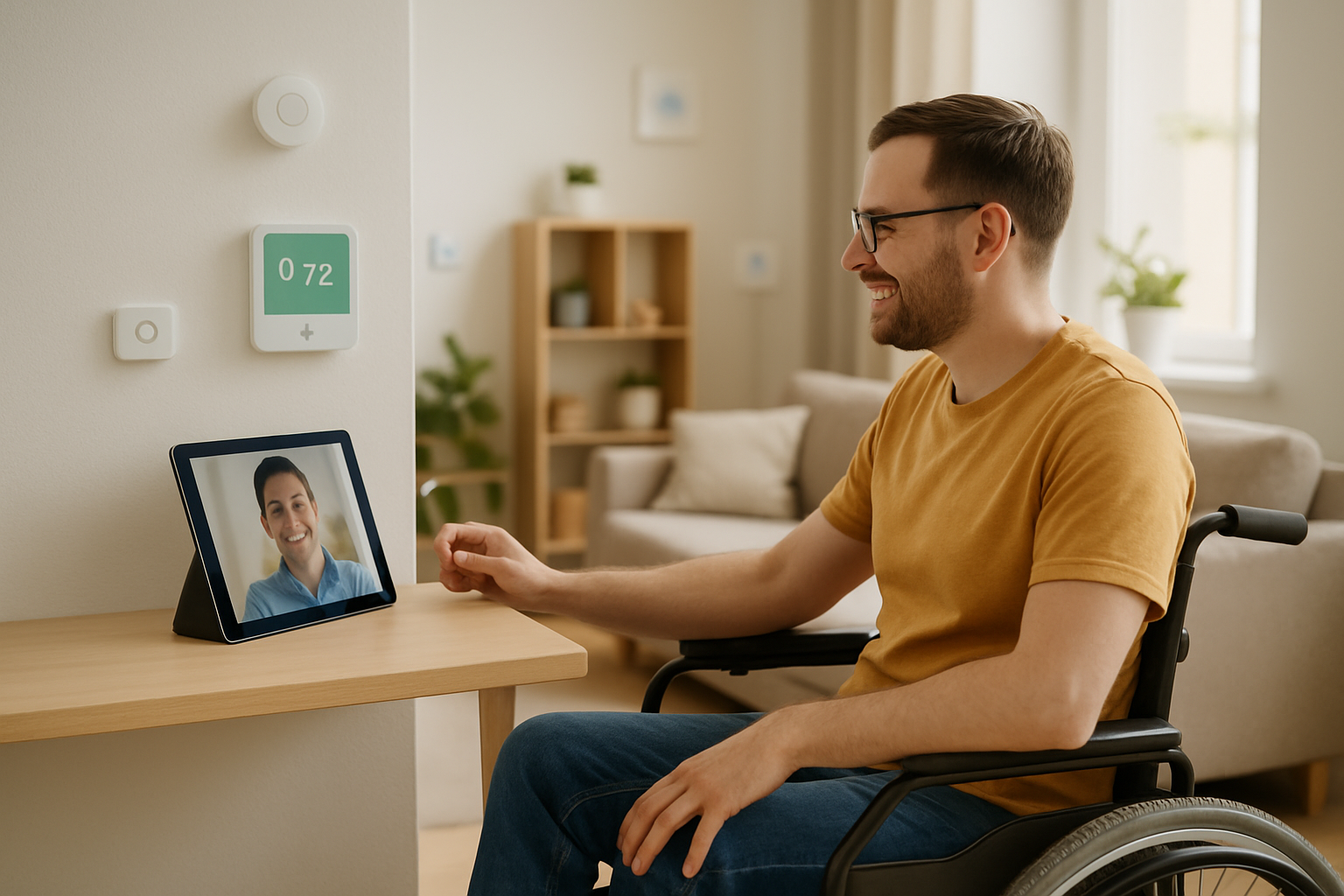Heylo Appoints First CEO, Poised for Revolution in Remote Disability Support

Cincinnati-based startup Heylo has announced a significant stride in its mission to revolutionize care for individuals with intellectual and developmental disabilities (I/DD) with the appointment of Brian Hart as its inaugural Chief Executive Officer. This strategic move signals a robust push towards scaling tech-driven remote support solutions, promising to redefine independence and address critical challenges within the I/DD care system.
Hart's appointment comes at a pivotal moment, as Heylo aims to combat shrinking staff, rising costs, and outdated infrastructure prevalent in traditional care models. The company's innovative platform, which integrates software, hardware like sensors and two-way video, and tailored service design, is set to modernize care delivery, expand independence for individuals with disabilities, and alleviate the immense workforce pressures faced by care providers.
A New Era for Assistive Technology: Heylo's Strategic Leadership and Growth Trajectory
The selection of Brian Hart as Heylo's first CEO marks a strategic alignment with the company's ambitious growth objectives. Hart, a recognized figure in the disability support sector, previously founded ShiftAbility, a consulting firm instrumental in guiding state systems and care providers through the transition from traditional in-person care to tech-enabled remote services. His expertise is expected to be invaluable in navigating Heylo's expansion and solidifying its position as a leader in assistive technology.
Heylo's immediate focus under Hart's leadership is on the widespread deployment of its integrated technology platform. This platform is designed to empower I/DD agencies to offer comprehensive remote supports, ensuring human connection remains central to care while significantly enhancing efficiency and safety. The company is actively piloting its solutions in key states, including Kansas, Pennsylvania, and New York, supported by early state innovation funding. These pilot programs are crucial in demonstrating the platform's efficacy in supporting more homes with fewer staff, proactively addressing incidents through smart sensors and real-time alerts, and ultimately reducing operational costs for care agencies.
The company's technology offers customizable alerts, an intuitive user interface for residents, and rapid deployment capabilities, allowing agencies to implement the system swiftly. This user-centric approach, combined with 24/7 two-way live support, positions Heylo to not only modernize care delivery but also to promote greater independence for individuals with disabilities in their own homes. The long-term implications include a significant reduction in the need for overnight shifts and a proactive approach to care, moving away from reactive interventions.
Market Ripple Effects: Winners and Losers in the Evolving Care Landscape
Heylo's aggressive push into tech-enabled remote support for individuals with disabilities is set to create significant ripple effects across the healthcare and technology sectors. Companies that embrace or develop complementary technologies stand to gain, while those entrenched in traditional, labor-intensive care models may face increasing pressure to adapt or risk losing market share.
Potential Winners:
- Assistive Technology Providers: Companies specializing in smart sensors, health monitoring devices, and two-way communication systems could see increased demand for their hardware and software components. Firms like ResMed (NYSE: RMD) or Philips (AMS: PHIA), which have strong healthcare technology divisions, might find opportunities for partnerships or integration with platforms like Heylo's.
- Home Care Agencies Adopting Technology: I/DD agencies and home care providers willing to invest in and integrate remote support technologies will likely benefit from improved efficiency, reduced operational costs, and the ability to serve more clients with existing or even smaller staff complements. This could give them a competitive edge in a tight labor market.
- Software-as-a-Service (SaaS) for Healthcare: Companies offering scalable cloud-based solutions for patient management, remote monitoring, and data analytics in healthcare could see increased demand.
- Telehealth Platforms: Existing telehealth providers might find new avenues for expansion by partnering with companies like Heylo to offer specialized remote support services for individuals with disabilities, broadening their market reach.
Potential Losers:
- Traditional In-Person Care Providers (Resistant to Change): Agencies heavily reliant on solely in-person, 24/7 staffing models, particularly those unwilling or slow to adopt technological solutions, may struggle with escalating labor costs and difficulties in recruiting and retaining staff. Their services could become less competitive and more expensive compared to tech-enabled alternatives.
- Legacy Hardware Providers: Manufacturers of outdated or non-integrated assistive devices that cannot seamlessly connect with modern remote monitoring platforms might see their market share erode as integrated solutions become the norm.
- Staffing Agencies for Direct Support Professionals: While the demand for direct support professionals will always exist, a shift towards remote support could alter the nature and volume of staffing needs, potentially impacting agencies that primarily supply traditional in-person care staff. They may need to pivot towards providing tech-savvy caregivers or training.
- Real Estate Developers for Large Residential Facilities: As remote support enables more individuals to live independently in their own homes or smaller community settings, the demand for large, institutional residential facilities might decrease over the long term, impacting developers focused on such properties.
The market is likely to see a consolidation of services, with technology becoming an indispensable component of quality care. Companies that innovate and collaborate to provide comprehensive, integrated solutions will be best positioned for growth, while those clinging to outdated models may face significant challenges.
Wider Significance: Reshaping the Landscape of Disability Care
Heylo's strategic move, marked by the appointment of Brian Hart and its focus on scaling remote support technology, represents a significant inflection point in the broader disability care industry. This event is not an isolated development but rather a potent acceleration of existing trends towards digital transformation, person-centered care, and sustainable workforce solutions in healthcare.
This initiative fits squarely within the broader industry trend of "Aging in Place" and "Living Independently," extending these concepts to individuals with I/DD. The emphasis on technology to enable greater autonomy aligns with a societal shift away from institutionalization towards community-based, integrated living. The COVID-19 pandemic also underscored the critical need for remote care capabilities, pushing telehealth and remote monitoring to the forefront as essential components of resilient healthcare systems. Heylo's platform is a direct response to this recognized need, offering a robust framework for continuity of care even in challenging circumstances.
The potential ripple effects on competitors and partners are substantial. Existing providers of assistive technology, from communication devices to environmental controls, will likely need to integrate more deeply with comprehensive remote support platforms or risk being sidelined. Companies like GrandCare Systems or SafelyYou, which offer similar remote monitoring and fall detection solutions, may see increased competition or opportunities for strategic partnerships to expand their offerings. Furthermore, this trend could spur innovation among smaller tech startups, fostering a vibrant ecosystem of specialized solutions that can be integrated into larger platforms.
From a regulatory and policy perspective, Heylo's advancements could drive further evolution in how remote support services are funded and regulated. States like Kansas, Pennsylvania, and New York, where Heylo is piloting its programs, are at the forefront of exploring and funding these innovative models. This could lead to a broader adoption of policies that incentivize technology integration in I/DD care, potentially influencing Medicaid waivers and other funding mechanisms to cover remote support technologies more extensively. There might be an increased focus on data privacy and security regulations as more personal health information is transmitted and managed digitally.
Historically, the evolution of disability care has moved from institutionalization to community living, largely driven by advocacy and policy changes like the Americans with Disabilities Act (ADA). The current shift towards tech-enabled remote support can be seen as the next logical step in this progression, leveraging modern technology to fulfill the promise of independence and inclusion. Comparisons can be drawn to the advent of telehealth in general healthcare, which initially faced skepticism but is now an indispensable part of medical care delivery, demonstrating the transformative power of technology in established sectors.
What Comes Next: Navigating the Future of Independent Living
Heylo's strategic trajectory under Brian Hart points towards a future where technology is not merely a supplement but a foundational element of disability support. In the short term, the company will likely focus on solidifying its pilot programs in Kansas, Pennsylvania, and New York, gathering critical data on efficacy, cost-effectiveness, and user satisfaction. Success in these early deployments will be crucial for securing further state funding, attracting private investment, and demonstrating a scalable model for nationwide expansion.
Over the long term, Heylo's growth could lead to several significant developments. We can anticipate a continuous refinement of its technology, incorporating more advanced AI and machine learning capabilities for predictive analytics, personalized care recommendations, and even more sophisticated anomaly detection. There's also a strong possibility of strategic pivots or adaptations, such as expanding beyond I/DD into other disability sectors or even aging care, leveraging its core remote support infrastructure. Partnerships with major healthcare providers (NYSE: HCA) or technology firms (NASDAQ: MSFT) could become a key strategy for accelerating market penetration and integrating its solutions into broader healthcare ecosystems.
Market opportunities will emerge not just for Heylo but for the entire ecosystem of companies supporting independent living. This includes developers of accessible smart home technologies, providers of specialized training for caregivers in tech-enabled environments, and even insurers looking for innovative ways to manage care costs while improving outcomes. Challenges will undoubtedly arise, including ensuring equitable access to technology for all income levels, navigating complex state-by-state regulatory landscapes, and overcoming potential resistance to technological change from some care providers or families.
Potential scenarios include Heylo becoming a dominant player in tech-enabled disability support, potentially leading to an acquisition by a larger healthcare technology conglomerate. Alternatively, its success could spur a wave of similar startups, fostering a highly competitive and innovative market. The most optimistic outcome involves a widespread adoption of such technologies, leading to a significant improvement in the quality of life and independence for millions of individuals with disabilities, while simultaneously creating a more sustainable and efficient care system.
A New Horizon for Disability Care: Key Takeaways and Investor Watch Points
Heylo's appointment of Brian Hart as CEO and its aggressive growth strategy in remote support technology for individuals with disabilities marks a pivotal moment for the care industry. The key takeaway is clear: technology is not just enhancing, but fundamentally transforming, how care is delivered, moving towards greater independence, efficiency, and personalization. This shift addresses critical systemic challenges, including workforce shortages and escalating costs, making it an imperative for the future of disability support.
Moving forward, the market will likely consolidate around integrated, tech-enabled solutions. Companies that can offer comprehensive platforms, combining hardware, software, and service design, will be best positioned for success. The emphasis on human connection within a tech-driven framework is crucial, ensuring that innovation serves to empower individuals rather than isolate them.
For investors, several key areas warrant close attention in the coming months. Watch for Heylo's progress in its pilot programs in Kansas, Pennsylvania, and New York, as successful outcomes here will be strong indicators of its scalability and market viability. Monitor state-level policy developments and funding initiatives related to remote support technologies, as these will directly impact market opportunities. Furthermore, observe how established healthcare providers and larger tech companies react to Heylo's advancements—whether through competitive offerings, partnerships, or acquisitions. The assistive technology market, particularly for I/DD, is ripe for disruption, and Heylo is positioning itself at the forefront of this change, signaling a promising, albeit evolving, landscape for both care recipients and stakeholders.
This content is intended for informational purposes only and is not financial advice
More News
View More




Recent Quotes
View More
Quotes delayed at least 20 minutes.
By accessing this page, you agree to the Privacy Policy and Terms Of Service.